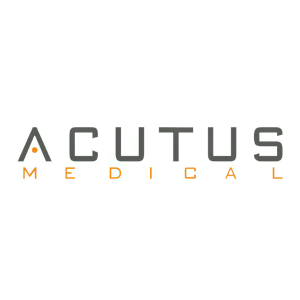RECOVER AF Study Reports 91% of First Redo Patients Achieved Freedom from AF at One Year After AcQMap-guided Ablation Therapy
Acutus Medical announced promising findings from the RECOVER AF study, published in EP Europace, highlighting the advantages of AcQMap-guided ablations for patients undergoing retreatment of atrial fibrillation (AF). Results showed that 76% of patients treated with AcQMap experienced freedom from AF after one year, significantly better than the traditional approach. Notably, patients with prior pulmonary vein isolation (PVI) achieved a remarkable 91% success rate. The study underscores the potential of advanced mapping techniques, revealing that personalized therapy improves patient outcomes and addresses a critical unmet need in arrhythmia treatment. Acutus aims to establish AcQMap as the gold standard in electrophysiology, targeting a multi-billion dollar market and enhancing the efficiency of AF procedures.
- 76% of patients treated with AcQMap achieved freedom from AF at 12 months.
- Patients with prior PVI had a 91% success rate in preventing AF recurrence.
- Demonstrates the efficacy of personalized therapy in AF ablation procedures.
- Potential to save the U.S. healthcare system nearly $30 million annually with a 1% reduction in redo ablations.
- Acutus aims to capture a significant share of the $3 billion addressable market.
- Conventional AF retreatment approaches yield only 60-68% freedom from AF after one year.
Insights
Analyzing...
CARLSBAD, Calif., April 20, 2023 (GLOBE NEWSWIRE) -- Acutus Medical, Inc. (“Acutus”) (Nasdaq: AFIB), an arrhythmia management company focused on improving the way cardiac arrhythmias are diagnosed and treated, today announced results from the RECOVER AF study. The study, published online in EP Europace, found that patients who received AcQMap-guided ablations for retreatment achieved better outcomes compared to those who underwent traditional anatomical retreatment strategies.1-3
Moreover, the study showed patients who had only undergone pulmonary vein isolation (PVI) before enrollment achieved
“These results are encouraging and add to the growing evidence that mapping AF to guide an individualized treatment plan may be advantageous at the earliest opportunity in patients with persistent AF,” says principal investigator Timothy R. Betts, MD, MBChB, FRCP (Oxford University Hospitals, UK). “Furthermore, the particularly high success rates for persistent AF retreatment patients with only a prior PVI, in contrast to those with prior PVI+, suggests that ablation beyond the PVs that is empiric and not informed by AF mapping could be detrimental.”
In the RECOVER AF study, AcQMap’s unique whole chamber single-beat non-contact mapping was used to map AF and detect Pathological Conduction Patterns (PCPs), which were then targeted for therapy with a core-to-boundary ablation strategy.
Conventional approaches to retreatment procedures for AF consistently result in unsatisfactory outcomes, with only 60
“The RECOVER AF study’s findings help advance our strategy to become the system-of-choice for EPs treating complex arrhythmias, including for patients undergoing treatment for persistent AF,” said David Roman, President & CEO of Acutus Medical. “Over the past year, we have focused the Company’s research and development, commercial, and clinical resources to support customers tackling the most challenging conditions in EP. Through technology innovation and further clinical evidence generation, we believe AcQMap has the potential to become standard-of-care across several arrythmias, and ultimately, impact over
Conference Call
The company will host a conference call to discuss results from RECOVER with the study’s principal investigator Timothy R. Betts, MD, MBChB, FRCP (Oxford University Hospitals, UK) on Friday April 21, 2023 at 12:00pm Eastern Time. Please register in advance using the link: https://edge.media-server.com/mmc/p/cp5ykbic.
About the RECOVER AF Study
RECOVER AF was a prospective, nonrandomized trial that enrolled patients scheduled for their first or second ablation retreatment for recurrent AF. PVs were assessed and re-isolated if necessary. AF maps were used to guide the ablation of non-PV targets through the elimination of pathologic conduction patterns (PCPs). The primary endpoint was freedom from AF on or off antiarrhythmic drugs (AADs) at 12 months.
Patients undergoing retreatment with the AcQMap System (n=103) were
The article can be viewed here on EP Europace: https://academic.oup.com/europace/advance-article/doi/10.1093/europace/euad097/7128319
About Acutus Medical
Acutus Medical (“Acutus” or the “Company”) is an arrhythmia management company focused on improving the way cardiac arrhythmias are diagnosed and treated. Acutus is committed to advancing the field of electrophysiology with a unique portfolio of technologies and solutions designed to enable physicians to treat more patients more effectively. Through internal product development, acquisitions, and global partnerships, Acutus has established a global sales presence that delivers targeted electrophysiology solutions for the catheter-based treatment of cardiac arrhythmias. Founded in 2011, Acutus is based in Carlsbad, California.
Follow Acutus Medical on: Twitter, LinkedIn, YouTube and Facebook.
Investor Contact
Caroline Corner
415-202-5678
caroline.corner@westwicke.com
Media Contact
Rhiannon Pickus
442-232-6094
Rhiannon.Pickus@acutus.com
References:
- Betts et al. Treatment of pathophysiologic propagation outside of the pulmonary veins in retreatment of atrial fibrillation patients: Recover AF study. Europace. 2023. doi:10.1093/europace/euad097
- Goldenberg et al. The incremental benefit of non-pulmonary vein left atrial ablation in patients undergoing a repeat persistent atrial fibrillation ablation procedure. J Interv Card Electrophysiol. 2017;48:185–191. doi: 10.1007/s10840-016-0198-8
- Weng et al. Outcomes of a comprehensive strategy during repeat atrial fibrillation ablation. J Interv Card Electrophysiol. 2022;65:391–399. doi: 10.1007/s10840-021-00970-w
- Acutus data on global AF procedure estimates. [Assumes ~450,000 AF procedures of which
43% are paroxysmal and57% are persistent and long-standing persistent AF (CABANA trial data). Retreatment AF was calculated using weighted averages and composite first procedure success rates across published trials]. - Mansour M et al. The impact of first procedure success rate on the economics of Atrial Fibrillation Ablation. JACC Clin Electrophysiol. 2017;3(2):129-138. doi: 10.1016/j.jacep.2016.06.002








